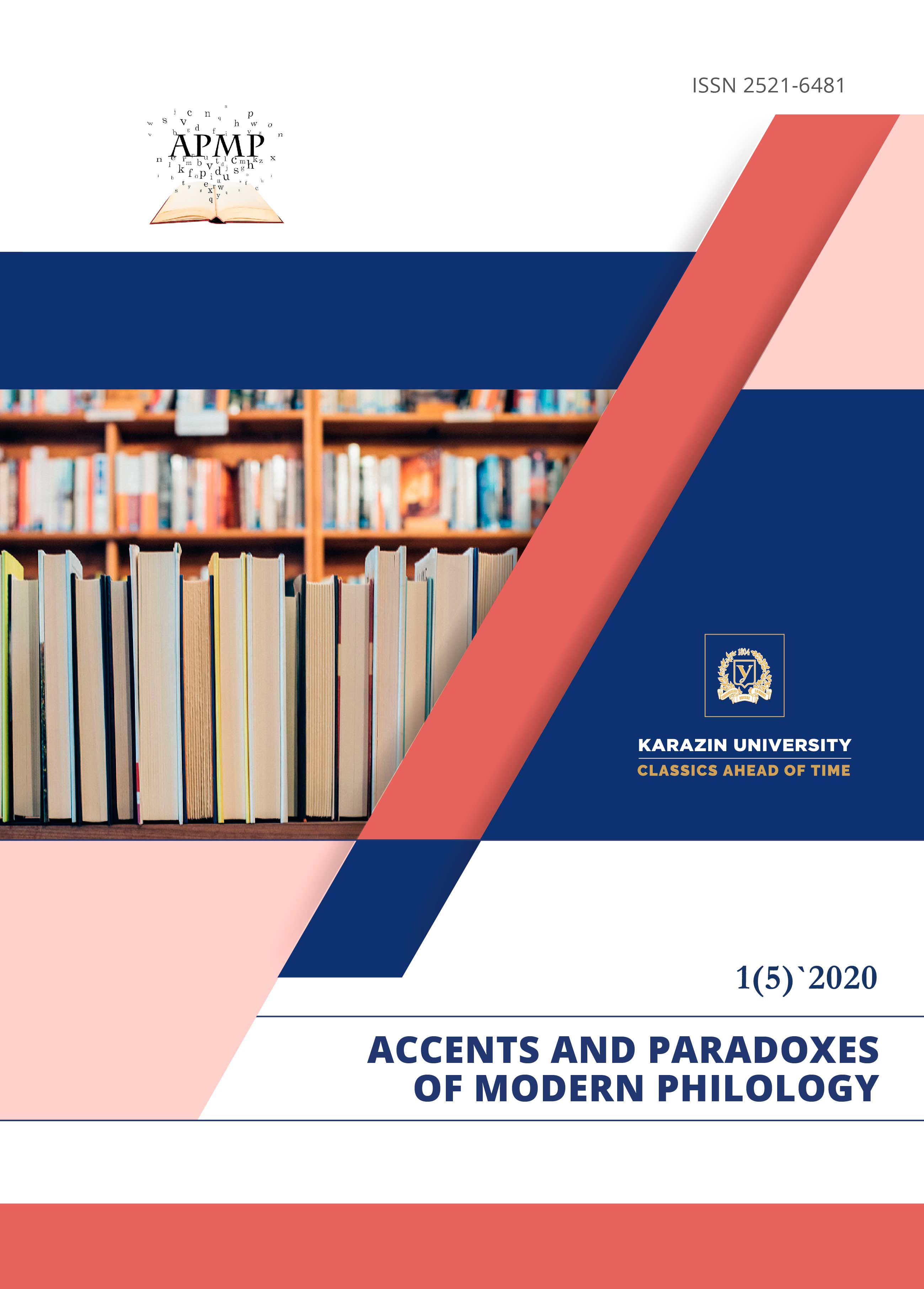THE IDENTITY CRISIS IN THE CONTEXT OF GLOBALIZATION IN THE NOVEL BY OLGA TOKARCZUK “FLIGHTS”
Abstract
This article considers the issue of the identity crisis in the context of globalization, represented in the novel Flights by Olga Tokarczuk, a Nobel Prize laureate and one of the best-selling Polish writers of our time. The artistic world of the novel reveals key features of globalization such as increasing global mobility, intensifying migrations, the dissipation of national borders, and the deactualization of national memory. O. Tokarczuk portrays an original type of a character acting in such conditions – a modern nomad that can be an emigrant, a refugee, a traveler, or a homeless person.
This paper focuses on the correlation between memory collapse and identity crisis depicted in several stories from the novel. It mainly considers the philosophical aspect of the issue, namely, people’s fear of death and desire for immortality expressed through their propensity for perpetual motion and rejection of individual and national memory. The topic of plastination (a method of body preservation), deeply elaborated throughout the novel, is examined in the context of interdependency between human’s body and identity.
Specific attention is dedicated to fragmentariness as essential characteristic of both formal side of the novel (composition, narrative) and its thematic range. Fragmentariness is also intrinsic to the artistic manifestation of memory, presented in the form of a heterogeneous archive. Providing an alternative, polyphonic narrative, O. Tokarczuk opposes it to any kind of a coherent, monolithic historical narrative.
Written in 2007, this novel is particularly interesting to analyze nowadays, when impugning the globalization values is becoming a common tendency. In the new context, Flights can be construed as a warning about creating a world devoid of memorial meaning. This article highlights a well-pronounced appeal to recollection and verbalization of the past. In the “narrating” of life, O. Tokarczuk sees the way to salvation and liberation, thus affirming the crucial role of memory in dealing with the identity crisis faced by contemporary societies.
Downloads
References
Adelgeim I. (2019) “Cellar stories, slippery stories wandering along walls...” Learning the experience of historical guilt in modern Polish prose / Adelgeim I. (Ed.) MEMORY vs HISTORY. Images of the past in the artistic practice of contemporary literatures of Central and South-Eastern Europe (pp. 325 – 334) Moskva: Institut slavianovedeniya RAN. (in Russian). DOI 10.31168/2618-8554.2019
Augé М. (1992) Non-places. Introduction to an Anthropology of Supermodenity. Moskva: Novoye literaturnoye obozreniye. (in Russian). ISBN 978-5-4448-0709-5
Dziadevych T. (2009) Olga Tokarczuk’s work: Several points. (Part II) [Web blog post]. Retrieved from: http://litakcent.com/2009/10/01/tvorchist-olhy-tokarchuk-kilka-krapok-nad-i-chastyna-ii/ . (in Ukrainian).
Nora P., М. Ozouf, Puymege de J., Winock M., (1999) France – Memory. Saint Petersburg: Izdatelstvo Sankt-Peterburgskogo universiteta. (in Russian).
Rudkovskaya М. (2019) Memory and Everyday Life. Alive and dead poetics in the works by Olga Tokarchuk (by the example of E. T. A. Hoffmann’s traditions) / I. Adelgeim (Ed.) MEMORY vs HISTORY. Images of the past in the artistic practice of contemporary literatures of Central and South-Eastern Europe (pp. 325 – 334) Moskva: Institut slavianovedeniya RAN. (in Russian). DOI 10.31168/2618-8554.2019
Czerminski J. (2019) Olga Tokarczuk podtrzymuje opinię, że Polacy robili rzeczy straszne. Rzechpospolita. Retrieved from: https://www.rp.pl/Polityka/191019249-Olga-Tokarczuk-podtrzymuje-opinie-ze-Polacy-robili-rzeczy-straszne.html.
Franklin R. (2019) Olga Tokarczuk’s Novels Against Nationalism, 12 (5) The New Yourker. Retrieved from: https://www.newyorker.com/magazine/2019/08/05/olga-tokarczuks-novels-against-nationalism
Gądek J. (2015) Słowa Olgi Tokarczuk o “mordercach Żydów” wywołały oburzenie. Onet. Kultura. Retrieved from: https://kultura.onet.pl/wiadomosci/slowa-olgi-tokarczuk-o-mordercach-zydow-wywolaly-oburzenie/etf0kw2
Shotter J. (2020) Nobel laureate Olga Tokarczuk: why populist nostalgia will pass. Financial Times. Retrieved from: https://www.ft.com/content/36cfd978-4c1a-11ea-95a0-43d18ec715f5
Sosin B. K. (2002). Dom dzienny, dom nocny Olgi Tokarczuk. W poszukiwaniu utraconej tożsamości. Annales Academiae Paedagogicae Cracoviensis. Studia Historicolitteraria I, 11, 167–177.
The Nobel Prize (2018) The Nobel Prize in Literature 2018. Retrieved from: https://www.nobelprize.org/prizes/literature/2018/summary/.
Tokarczuk O. (2017) Flights. London: Fitzcarraldo Editions.
Ukleja K. (2012) Poszukiwanie tożsamości w «Domu dziennym, domu nocnym» Olgi Tokarczuk. Annales Universitatis Paedagogicae Cracoviensis. Studia de Arte et Educatione, 7, 123–130. ISSN 2081–3325
Wieliczko K. (2012) Ludzie bez właściwości. Przygody z tożsamością w powieściach Olgi Tokarczuk. Akcent, 1, 77–86.
Żarczyńska M. (2004) Problematyka tożsamości w powieściach Olgi Tokarczuk. Swojskość i obcość. O kategorii tożsamości w piśmiennictwie polskim na przełomie wieków. Prace literaturoznawcze poświęcone pamięci dr M. Żarczyńskiej, 21–34.




